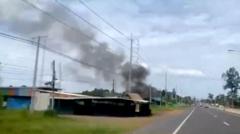In July, the previously simmering border tensions between Thailand and Cambodia erupted into violence, leading to the deaths of at least 12 Thai citizens, primarily civilians, according to Thai authorities. With the Cambodian side's casualties unreported, both nations are engaging in a war of words regarding the conflict's origins.
This feud isn't new; it traces back over a century to the demarcation of borders established after French colonial rule in Cambodia. Hostility reigned even stronger in 2008 when Cambodia sought to register the ancient 11th-century Preah Vihear Temple, located within the debated territory, as a UNESCO World Heritage site, sparking fierce protests from Thailand. Sporadic clashes over the years have resulted in casualties for both military and civilian populations.
Recently, the bilateral relations hit a new low after a Cambodian soldier was killed during a skirmish in May, resulting in heightened military posturing from both countries. In reaction to the tensions, Cambodia banned Thai imports, including fruits and vegetables, as well as halting power and internet services.
On Thursday, differing accounts of the skirmish emerged from both nations. According to Thailand's National Security Council (NSC), Cambodian troops deployed drones to conduct surveillance, followed by firing rocket-propelled grenades at Thai forces. In retaliation, Thai officials claimed to have resorted to airstrikes on Cambodian military positions.
Conversely, Cambodian officials reported that Thai soldiers initiated hostilities by advancing towards the Khmer-Hindu temple near the border and firing warning shots into the air. They claimed their military acted only in self-defense after being met with aggressive actions from Thai forces.
Regarding the potential for escalation, Thailand's acting Prime Minister Phumtham Wechayachai emphasized the need for careful negotiations, while Cambodian Prime Minister Hun Manet expressed an intent to resolve the issue peacefully, albeit asserting the right to respond to aggression. Observers remain cautiously optimistic, suggesting there's a precedent for de-escalation despite a deficit of strong leadership on both sides currently.
Travel advisories for the region remain largely unchanged; however, authorities urge caution in affected zones with some border crossings recently closed. While localized, the conflict's developments prompt concerns among international travelers.




















